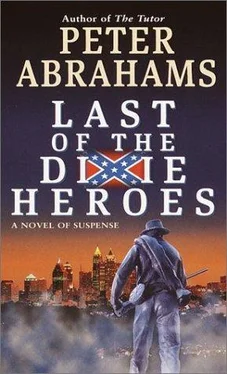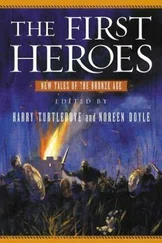Peter Abrahams - Last of the Dixie Heroes
Здесь есть возможность читать онлайн «Peter Abrahams - Last of the Dixie Heroes» весь текст электронной книги совершенно бесплатно (целиком полную версию без сокращений). В некоторых случаях можно слушать аудио, скачать через торрент в формате fb2 и присутствует краткое содержание. Жанр: Триллер, на английском языке. Описание произведения, (предисловие) а так же отзывы посетителей доступны на портале библиотеки ЛибКат.
- Название:Last of the Dixie Heroes
- Автор:
- Жанр:
- Год:неизвестен
- ISBN:нет данных
- Рейтинг книги:4 / 5. Голосов: 1
-
Избранное:Добавить в избранное
- Отзывы:
-
Ваша оценка:
- 80
- 1
- 2
- 3
- 4
- 5
Last of the Dixie Heroes: краткое содержание, описание и аннотация
Предлагаем к чтению аннотацию, описание, краткое содержание или предисловие (зависит от того, что написал сам автор книги «Last of the Dixie Heroes»). Если вы не нашли необходимую информацию о книге — напишите в комментариях, мы постараемся отыскать её.
Last of the Dixie Heroes — читать онлайн бесплатно полную книгу (весь текст) целиком
Ниже представлен текст книги, разбитый по страницам. Система сохранения места последней прочитанной страницы, позволяет с удобством читать онлайн бесплатно книгу «Last of the Dixie Heroes», без необходимости каждый раз заново искать на чём Вы остановились. Поставьте закладку, и сможете в любой момент перейти на страницу, на которой закончили чтение.
Интервал:
Закладка:
“Fixin’ to die?” he said.
“That’s very good,” said the lieutenant.
Roy didn’t need to hear that: he knew it was good-that was how they talked, his father, his grandfather, his great-grandfather, his great-great-grandfather; and him.
“In terms of authenticity?” said the private.
“Did you say something, soldier?” said the lieutenant.
“Sir. In terms of authenticity, sir, what he said being very good.”
“More like it,” said the lieutenant. “Yes, this reb is particularly authentic. So he must know that the right response here is to throw down that gun. Meaning just lay it down gently-I know what these things cost.”
“Out of my way,” Roy said.
“What you forget,” said the lieutenant, “is that you’ve got one shot to our two. That’s what makes the decision easy, weapons dictating tactics.”
“Even easy enough for a dumb reb,” said the private, adding, “sir.”
A cry rose up from the plateau, very faint, but Roy knew whose it was. “Last chance,” he said.
“Is this a hearing problem?” the lieutenant said. “Or ADD?”
Roy shot him between the eyes.
No doubt about it: Roy was deadly and how could he miss from that range? The lieutenant said, “Ow,” as the paper wad smacked his forehead with a noise like a book sharply closed.
Paper wad? Ow? What was this? It took Roy a moment or two to realize he’d fired a blank. But how? He knew he’d had a live round in that chamber. Roy flipped open his cartridge pouch: blanks, all blanks, where live rounds had been before. He’d been betrayed. The war was lost.
“Jesus Christ,” the lieutenant was saying. He felt his forehead-red welt already rising-said, “Ow,” again.
“Could of taken out his eye,” said the private. “Don’t you know the rules?”
“And I’m a photography teacher, you asshole,” said the lieutenant, turning on Roy, “which your lawyer won’t be happy about, not one damn bit.”
These Yankees were all red-faced and furious, but about what Roy wasn’t sure. It didn’t matter: whack, whack, and they were both on the ground, Roy racing down the slope to the plateau.
And yes, the rebel yell, so huge it could have been the voice of the mountain itself.
TWENTY-EIGHT
Roy had a gun but no bullets, no bayonet neither- neither, there was his ancestor thinking now, right with him in his head. No bayonet because his weapon, ancestral instructions carved on the stock, was a carbine; he knew that now, wouldn’t let the cause down through ignorance again. No shooting or stabbing possible, but Roy did have his strong body, even stronger with these fresh new springs of ferocity rising up within him, and he had the knowledge, so late arriving, of what he was born, if not bred, to be: a fighting man.
He came down off the slope, tore down it really, his speed almost sickening although strangely silent, all nature covering for him, and into the apple trees in back of the plateau, trees planted by his ancestor for the comfort of his descending line, their nourishment, even their concealment, if necessary. The clear dawn light made the tiny new apples gleam like hard painted decorations, bright red. The color encouraged him.
Roy ran through the slave quarters, into the Mountain House. Through the hole in the wall where the front door had stood, Roy caught sight of the Yankees beyond the collapsed tents, standing over the Confederates, Confederates on their knees. On their knees!
No one saw Roy. That meant he had not only his raw strength, but the element of surprise as well, an element he hadn’t considered much in his life, knew only from the receiving end. This was going to be much better. He burst out of the Mountain House, his gun gripped by the barrel, death on its stock, so ready, so able, never more so, felt a sudden sharp pain across one shin, and went spinning through the air. Then came a tumbling glimpse of two Yankees crouched behind him, holding a thin line across the doorway, and the ground rose fast to meet him, like the beginning of some explosion from deep down, one of Ezekiel’s mountain forces on the move. Roy tried to get his hands out front, protect his head, but couldn’t, what with trying to protect the gun too. Then he was seeing two moons again. Before he could work them back down to one, or none since it was daylight, blue bodies were swarming over him.
Roy made them pay, one with his elbow, another with his fist, and then he was on his feet, swinging his weapon so hard it whistled in the air like a whip. The Yankees all backed off, eyes widening-Vandam too, his nose swollen and discolored from Chickamauga-as Roy stood on the threshold of the Mountain House.
“Get off my land,” he said. His voice echoed off the mountain. At least, he thought it did, and was listening so intently to the echo, like another one of those forces on the loose, the mountain and he speaking as one, that he almost missed softer sounds behind him. He started to turn, heard a bad noise inside his skull.
They sat outside the Mountain House, blue and gray together, except blue sat in the shade of the apple trees and gray in the sun; a hot white sun, the first real hot one of the year, directly overhead. Roy was very thirsty, conscious at first only of that and the sun sucking him dry, his body the water supply for a demanding master; then, after a while, conscious of blue and gray together, outside the Mountain House. He was wondering whether the war was over when he noticed that everyone in gray was tied up, arms behind the back, him included.
Roy looked around. Things came into focus: the stubborn little tuft of hair, already growing back on Rhett’s head; a drying-up trickle of blood running from one of Sonny’s ears down his neck; Lee’s jacket, the top two or three buttons dangerously open; a variety of expressions on the faces of the Irregulars, all of which Roy had seen before at halftime in football locker rooms whenever they were getting their asses whipped. He knew that was where he had seen these looks, but that world was distant, as though he’d come across it only in books. This was the real thing, when you started to realize you might lose not a game, but everything, when the enemy wasn’t the Gators or the Yellowjackets, but Sherman and Grant. When that happened, some realized and quit, like Dibrell; some got bewildered, like Gordo; some kept calculating odds and strategies, like Jesse; some couldn’t be read, like Lee; some didn’t bother to realize and wouldn’t quit, like Sonny Junior; some did realize and wouldn’t quit, like himself.
Captain Peterschmidt came forward, crossing the line between shadow and sun. His muttonchops had a rusty tinge in the light. “Chickamauga was a fluke,” he said, hand on his sword. “Guess you rebs know that by now.” Was he talking about Lee’s successful tent attack and Roy’s subsequent rescue, or Longstreet’s breakthrough at the Brotherton cabin? Made no difference to Roy: either way, this Yankee was saying they couldn’t fight, and that was a damned lie. Roy tested the rope binding his wrists, a thick, bristly rope, the knots tight, and got nowhere.
“Under the rules of warfare, you are all prisoners of the United States,” Peterschmidt said. “Don’t be alarmed. There are no Andersonvilles where we come from.”
“And no Fort Pillows either,” said a Yankee corporal.
“Maybe there should be,” said the Yankee lieutenant Roy had tangled with up the slope, his eyes, the one that was open, anyway, on Roy. The private beside him, with a bloody cloth around his head, started to nod, winced, and stopped.
“And since transportation of prisoners would be difficult in this case,” Peterschmidt said, “it’s our intention to take only one, as insurance for your future good conduct.”
Читать дальшеИнтервал:
Закладка:
Похожие книги на «Last of the Dixie Heroes»
Представляем Вашему вниманию похожие книги на «Last of the Dixie Heroes» списком для выбора. Мы отобрали схожую по названию и смыслу литературу в надежде предоставить читателям больше вариантов отыскать новые, интересные, ещё непрочитанные произведения.
Обсуждение, отзывы о книге «Last of the Dixie Heroes» и просто собственные мнения читателей. Оставьте ваши комментарии, напишите, что Вы думаете о произведении, его смысле или главных героях. Укажите что конкретно понравилось, а что нет, и почему Вы так считаете.












